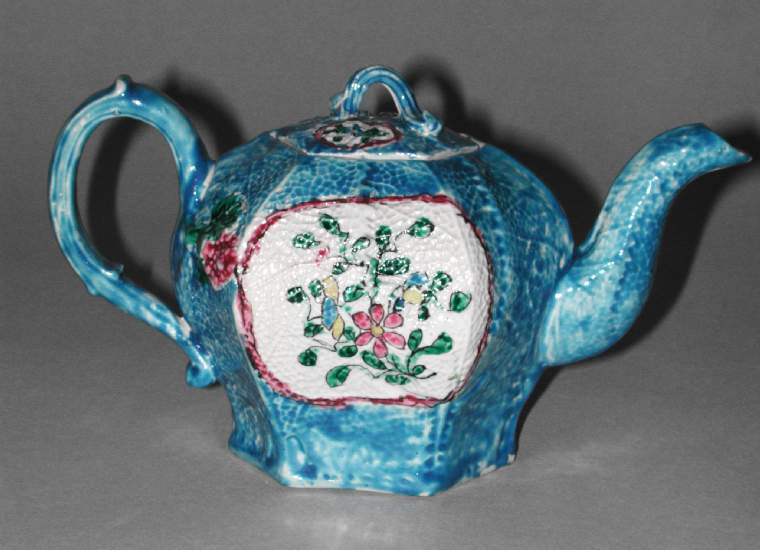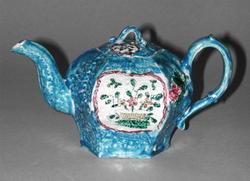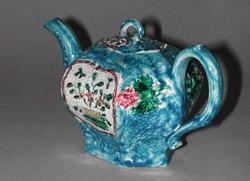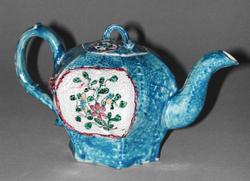Awaiting location update
Maker(s)
Pottery:
Unidentified Staffordshire Pottery
Entities
Categories
Description
Salt-glazed stoneware painted in enamels with a turquoise blue ground and floral decoration om reserves
White salt-glazed stoneware painted overglaze in blue, green, pink, yellow and black enamels. The bulbous hexagonal body has an s-curved spout and a loop handle; on the lid is a twidyrf ribbed handle. The body and spout are moulded with serrated-edge leaves in relief. Sprigged to the body on either side of the handle are additional moulded vine leaves and grape-bunches. The teapot is painted in a bright sky blue except for the vine leaves, which are green, the grapes, which are purplish-pink, and the almost round reserves on each side of the teapot. The reserves have a dark purplish-pink border and contain, on one side of the teapot, a spray of flowers and, on the other, a vase of flowers. Two similar flower-filled, purplish-pink-bordered reserves decorate the lid.
Notes
History note: Formerly in the collection of J. Henry Griffiths; later in the collection of Wallace Elliot and purchased by the Fitzwilliam Museum on 20 May 1938 as Lot.94 in at the Wallace Elliot sale, Sotheby’s, from the Glaisher Fund
Legal notes
Purchased from the Glaisher Fund.
Measurements and weight
Width: 17.5 cm
Acquisition and important dates
Method of acquisition: Bought
(1938-05-20)
by
Sotheby's
Dating
18th Century, Mid
George II
George III
Circa
1755
CE
-
Circa
1765
CE
Note
The use of a coloured ground around a central reserve is designed to imitate the decoration of contemporary European porcelain. The bright sky blue colour used on this teapot emulates the famous ‘bleu céleste’ ground colour introduced by the Vincennes porcelain manufactory in 1753, although the coverage is not as even or as neat as was achieved by the French porcelain manufacturers. English potters produced salt-glazed stoneware, a relatively cheap product, in imitation porcelain, a very expensive one, in order to meet the demand of the middle classes. In the 18th-century there was a large, aspiring middle class in England, who wanted to emulate the habits of the gentry, including the elaborate social ritual of tea-drinking, but could not afford the luxury European and Oriental porcelain teawares used by the wealthy.
School or Style
Rococo
Components of the work
Body With Lid
Height 10.1 cm
Body Without Lid
Height 9.5 cm
Vine-leaves
Materials used in production
turquoise-blue, green, pink, purplish-pink, yellow and black enamels
Enamels
white
Stoneware
Salt-glaze
Techniques used in production
Press-moulding
: Press-moulded stoneware body, with applied moulded handle and spout and sprigged vine reliefs, salt-glazed and painted overglaze in turquoise-blue, green, pink, purplish-pink, yellow and black enamels
Painting overglaze
Salt-glazing
Inscription or legends present
Inscription present: stick-on white paper collector's label with brown border and printed with a brown elephant head
- Text: No.5 SALT-GLAZED PERIOD iii 1741-1760
- Location: On base
- Method of creation: Handwritten in black ink
- Type: Label
Inscription present: stick-on white paper collector's label with brown border and printed with a brown elephant head
- Text: No.5 SALT-GLAZED PERIOD iii 1741-1760
- Location: Inside lid
- Method of creation: Handwritten in black ink
- Type: Label
Inscription present: stick-on circular paper label
- Text: J. HENRY GRIFFITH'S/COLLECTION printed round the edge, and ? 178 in the middle in pencil
- Location: On base
- Method of creation: Handwritten in pencil with printed blue text in border
- Type: Label
References and bibliographic entries
Identification numbers
Accession number: EC.25 & A-1938
Primary reference Number: 76918
Stable URI
Audit data
Created: Saturday 6 August 2011
Updated: Monday 29 April 2024
Last processed: Tuesday 13 May 2025
Associated departments & institutions
Owner or interested party:
The Fitzwilliam Museum
Associated department:
Applied Arts







